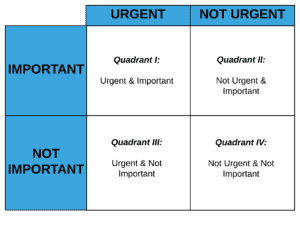
Struggle with time management? Focus on priority management instead
by Tom Morton
Do you sometimes reach the end of a day at work and think that you've achieved very little despite being frantically busy all day?
Maybe it's time for a look at how you organise your time!
We all have the same amount of time (168 hours a week) so it's not so much time management as priority management together with time effectiveness.
Here's a suggested system, based on Stephen Covey's four quadrants (I = Important and Urgent, II = Important but Not Urgent, III = Urgent but Not Important, and IV = neither Important nor Urgent) and David Allen's Getting Things Done. It's based on the old idea of Rocks, Pebbles, and Sand (if you put the sand in first, you'll never be able to fit the rocks and pebbles in).
On Sunday evening:
- Do a brain dump of EVERYTHING on your to do list (or, in subsequent weeks, update of the master list to include new items from the week previous -- see below).
- Allocate a quadrant number to each item. Q1 through Q4. Use the following graph to help:

- The Q1's HAVE to be done -- give these diary slots in the coming week as if they were client/customer meetings -- and treat them as client meetings (i.e. they can't be moved). These are the Rocks.
- The Q2's are usually projects of some kind (e.g.get fit, develop sales system, etc). If neglected they will eventually become Q1's. Decide how much time you're prepared to spend each week (and preferably, each day) to take these forward, and then diarise that time (in the coming week) as per Q1's above (label it "Q2 time") -- this also is immoveable (even if it's only 15 minutes a day). These are the Pebbles.
- The Q3's -- collate these on to a separate list. Delegate what you can (if it's worth the time to delegate) -- otherwise knock them off as and when you have spare time during the week -- these are the Sand.
- The Q4's -- collate these on to a separate list but do NOTHING to them during the week.
On the following Sunday evening:
- Update the master list to cross off what has been done and add what's arrived during the week
- The Q1's should all have been done (!)
- The Q2's should have at least moved forward (even if only by a little)
- The Q3's -- review to see if they're still worth keeping on the list (be ruthless!) -- if so, keep for one more week (if they're still there after 2 weeks they almost certainly ain't going to be done, so cross them off)
- The Q4's -- has the roof fallen in because you've done nothing on these? Assuming the answer is NO, then cross them off (again, be ruthless!)
It's hard to start with, but gets easier! You have to give it a fair trial.
Advantages
- You have an overall view of the whole battlefield (like a Napoleonic general -- and the word "strategy" comes from the Greek "strategos", meaning "a general") -- this relieves a lot of stress (you're not continually troubled by random thoughts of "mustn't forget to do X", etc).
- The chances are that the time you actually spend on Q1's and Q2's is much better quality time (because there are fewer distractions) and therefore more gets done.
- You avoid the most common problem, which is to do the Q3's before the Q2's (which consequently never get done).
- The only other way to get more done is to expand work time at the expense of home time -- which is not the way to go!
This works perfectly well on a pencil and paper system, if that's what you prefer. I use an app (on my iPad) called Things.
Tom Morton - TAB Harrogate
Related articles

Time Management: Theory and Practice
This is a comprehensive guide to time management, its theories and putting them into practice. Learn all about time management with this in-depth post.

Want to Keep Your Team Happy and Productive? Start Here
Discover proven strategies to boost employee happiness and productivity, fostering a thriving business environment. Learn practical tips for effective people management and team engagement.





